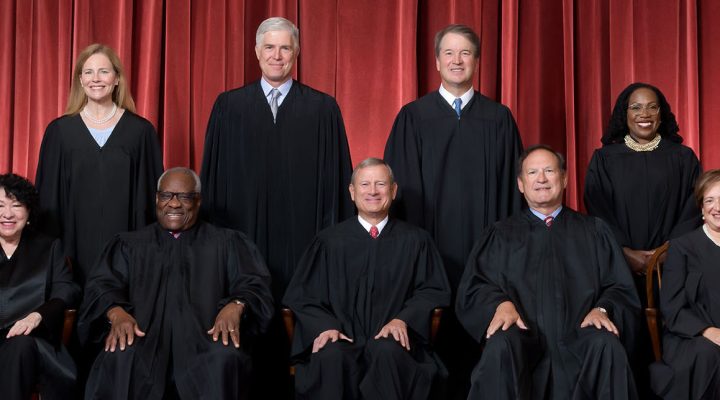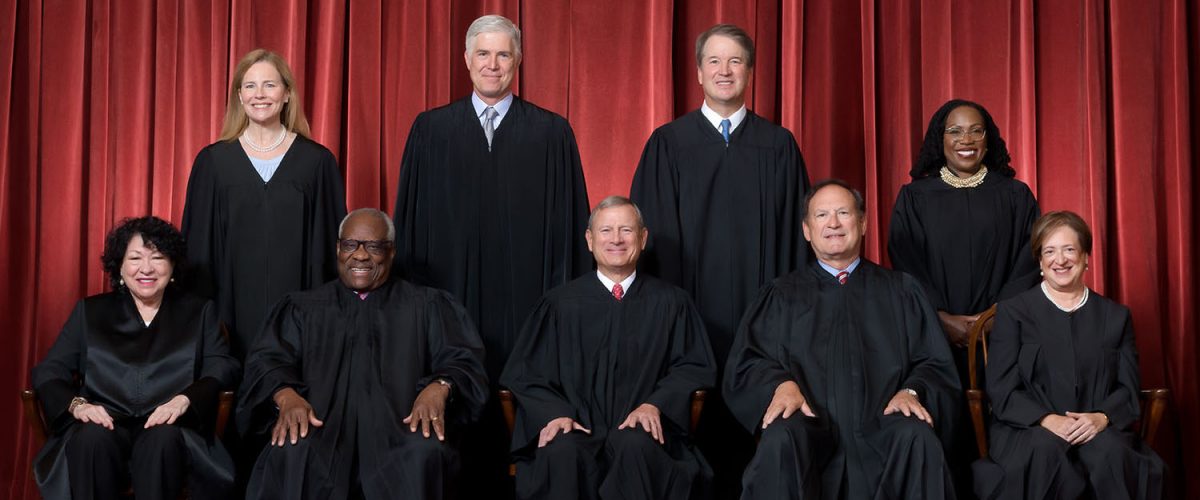Reading the recently released Supreme Court verdict in the case of Trump v. United States, I couldn’t help thinking that before we put the Ten Commandments in “every classroom,” nationwide, we’d best post them in every room of the White House, you know, where American presidents live and work.
Since the court’s verdict essentially immunizes American presidents past, present and future from criminal prosecution for actions carried out as part of their “executive power,” the Ten Commandments should be omnipresent throughout their executive domain.

Bill Leonard
Page two of the democracy-abating verdict, approved by the now standard 6-3 majority, reads:
Article II of the Constitution vests “executive power” in “a president of the United States of America.” The president has duties of “unrivaled gravity and breadth.” His authority to act necessarily “stem(s) either from an act of Congress or from the Constitution itself.” In the latter case, the president’s authority is sometimes “conclusive and preclusive.” When the president exercises such authority, Congress cannot act on, and courts cannot examine, the president’s actions. It follows that an Act of Congress — either a specific one targeted at the president or a generally applicable one — may not criminalize the president’s actions within his exclusive constitutional power. Neither may the courts adjudicate a criminal prosecution that examines such Presidential actions. The court thus concludes that the president is absolutely immune from criminal prosecution for conduct within his exclusive sphere of constitutional authority.
Leaving almost no immunized stone unturned, the six Justices added:
In dividing official from unofficial conduct, courts may not inquire into the president’s motives. Such a “highly intrusive” inquiry would risk exposing even the most obvious instances of official conduct to judicial examination on the mere allegation of improper purpose. Nor may courts deem an action unofficial merely because it allegedly violates a generally applicable law. Otherwise, presidents would be subject to trial on “every allegation that an action was unlawful,” depriving immunity of its intended effect.
That ruling, it seems, has both legal and theological connotations. Legally, wouldn’t that mean that if a president called an election official in, let’s say Georgia, and asked him to find an additional 11,000 votes so he could win the state, the president’s motives for that request can’t be questioned?
“I’m no lawyer, but as a student of history and theology, I’m terrified by their ruling.”
Theologically, the six practicing-Christian justices apparently overlooked certain biblical precedents, like the prophet Nathan’s “highly intrusive” inquiry into King David’s motives for sending his mistress’ husband into the front lines of battle. And getting him killed. (See 2 Samuel 11.) I’m no lawyer, but as a student of history and theology, I’m terrified by their ruling.
“Courts may not inquire into the president’s motives” sounds like potential immunity for another Auschwitz.
Three justices, all female, dissented, including Justice Sonia Sotomayor, who wrote of the majority’s action:
The court now confronts a question it has never had to answer in the nation’s history: Whether a former president enjoys immunity from federal criminal prosecution. The majority thinks he should, and so it invents an atextual, ahistorical, and unjustifiable immunity that puts the president above the law.
Sotomayor concluded:
Let the president violate the law, let him exploit the trappings of his office for personal gain, let him use his official power for evil ends. Because if he knew that he may one day face liability for breaking the law, he might not be as bold and fearless as we would like him to be. That is the majority’s message today. Even if these nightmare scenarios never play out, and I pray they never do, the damage has been done. The relationship between the president and the people he serves has shifted irrevocably. In every use of official power, the president is now a king above the law.
Law School professors also offered critiques.
- Harvard Law Emeritus Professor Laurence Tribe: “This decision may seem like a reflection of a rogue conservative majority that can, in time, be changed. But it is a sign of a much deeper problem — one that, when the time is ripe, will require constitutional reforms to solve and perhaps even a new branch of government. Although the opinion features a high-minded disclaimer that the court is not granting Mr. Trump or any future president complete immunity, the practical effect of this decision is presumptive immunity for all future presidents and complete immunity by delay for Mr. Trump.”
- Kim Wehle, law professor at University of Baltimore School of Law: “I’m not surprised that the court ruled for immunity. They wouldn’t have taken this case, and they wouldn’t have framed it so broadly, if they weren’t going to manufacture, you know, a new part of the Constitution, essentially. But I was surprised at how close to the line of absolute immunity. It’s very hard to see what is still left of criminal liability in the rule of law for presidents moving forward under the very loose test that the court established in its majority opinion today.”
- Kate Shaw, law professor at the University of Pennsylvania Cary Law School noted the “broad immunity from criminal prosecution” granted in the “court’s radical decision.” She added that “it should also be understood as a decision about the court’s own power and accountability. … It is increasingly clear that this court sees itself as something other than a participant in our democratic system. It sees itself as the enforcer of the separation of powers, but not itself subject to that separation.”
In her published dissent to the majority’s ruling, Justice Ketanji Brown Jackson describes an authority that sounds strangely parallel to that of the 1870 Vatican Council reasoning on papal infallibility. She wrote:
In short, America has traditionally relied on the law to keep its presidents in line. Starting today, however, Americans must rely on the courts to determine when (if at all) the criminal laws that their representatives have enacted to promote individual and collective security will operate as speedbumps to presidential action or reaction. Once self-regulating, the Rule of Law now becomes the rule of judges, with courts pronouncing which crimes committed by a president have to be let go and which can be redressed as impermissible. So, ultimately, this court itself will decide whether the law will be any barrier to whatever course of criminality emanates from the Oval Office in the future. The potential for great harm to American institutions and Americans themselves is obvious. … We also now have a greatly empowered court, which can opt to allow Congress’ policy judgments criminalizing conduct to stand (or not) with respect to a former president, as a matter of its own prerogative.
What if the court’s action not only bestows a monarchial-like immunity to presidents, as Justice Sotomayor asserts, but also, as Professor Shaw and Justice Jackson indicate, suggests an implicit papal-like infallibility upon the six members of the high court’s conservative majority, five of whom are Roman Catholic traditionalists?
Is this verdict further evidence of ways in which immunity, inerrancy, originalism, infallibility, Christian nationalism, Project 2025 and politics intersect in today’s America? Whatever else, at least we have to ask, while we still can.
In 1870, facing the onslaught of modernity and diminishing political power, Vatican Council I approved Pastor aeternus, setting forth the doctrine of papal infallibility. It reads:
Therefore, faithfully adhering to the tradition received from the beginning of the Christian faith, for the glory of God Our Savior, the exaltation of the Catholic Religion, and the salvation of Christian people, the Sacred Council approving, We teach and define that it is a divinely revealed dogma: that the Roman Pontiff, when he speaks ex Cathedra, that is, when in discharge of the office of Pastor and Teacher of all Christians, by virtue of his supreme Apostolic authority, he defines a doctrine regarding faith or morals to be held by the Universal Church, by the divine assistance promised to him in blessed Peter, is possessed of that infallibility with which the divine Redeemer willed that His Church should be endowed for defining doctrine regarding faith or morals: and that therefore such definitions of the Roman Pontiff are irreformable of themselves, and not from the consent of the Church.
“Infallibility, if you’ve got or claim it, is best used sparingly.”
To the Holy See’s abiding credit, popes have only exercised their ex cathedra authority in two instances: First as generally applied to Pius IX’s earlier 1854 document Ineffabilis Deus, which promulgated the doctrine of the Immaculate Conception of the Blessed Virgin Mary, and in Pius XII’s 1950 declaration Munificentissimus Deus, affirming Mary’s bodily assumption. Infallibility, if you’ve got or claim it, is best used sparingly.
As Justice Jackson sees it, the court majority in this case shows no such hesitation in extending its infallibility. She notes:
The majority displays no such caution or humility now. Instead, the court today transfers from the political branches to itself the power to decide when the president can be held accountable. What is left in its wake is a greatly weakened Congress, which must stand idly by as the president disregards its criminal prohibitions and uses the powers of his office to push the envelope, while choosing to follow (or not) existing laws, as he sees fit. We also now have a greatly empowered court, which can opt to allow Congress’ policy judgments criminalizing conduct to stand (or not) with respect to a former president, as a matter of its own prerogative.
This decision by the Supreme Court majority expands the existing list of national uncertainties, divisions and dangers in culture and churches alike. It opens the door to a judicially immune autocrat, not in some distant future, but in the next few months.
Which brings us back to the Ten Commandments. Given the court’s ruling, it might be helpful to add a disclaimer at the end of every classroom posting: “These Commandments do not necessarily apply to the president of the United States when fulfilling his(?) ‘executive power.’”
Bill Leonard is founding dean and the James and Marilyn Dunn professor of Baptist studies and church history emeritus at Wake Forest University School of Divinity in Winston-Salem, N.C. He is the author or editor of 25 books. A native Texan, he lives in Winston-Salem with his wife, Candyce, and their daughter, Stephanie.


